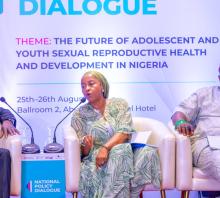National Policy Dialogue: Shaping the Future of Adolescent and Youth Sexual and Reproductive Health in Nigeria
Abuja, Nigeria: Nigeria is prioritizing adolescent health, well-being and development through multisectoral collaboration, in line with the National Health Sector Strategic blueprint and National policy on Health and development of Adolescent and young people. This was the central message of the National Policy Dialogue on the Future of the Adolescent and Youth Sexual Reproductive Health and Development (AYSRH&D), which convened key diverse stakeholders in Abuja to chart a unified path for adolescent health and well-being in the country. The event underscored the power of multisectoral collaboration and meaningful adolescents and youth engagement in shaping sustainable national programmes.
What Happened and Why It Matters
The two-day dialogue, held at the Abuja Continental Hotel, was convened by the Society for Family Health in collaboration with the Federal Ministry of Health and Social Welfare, the Federal Ministry of Youth Development, and the State Ministries of Health from Kano, Kaduna, Kwara, and Nasarawa.
The event brought together a diverse coalition of stakeholders, including representatives from Ward Development Committees across the four states, members of the Nigeria National Assembly, the World Health Organization (WHO), the Nigeria Governors Forum, Nigeria Health Watch, youth-led organizations, traditional institutions, and private sector partners.
The goal was to make adolescent and youth health a central part of Nigeria’s development plans. By working together, ministries and partners aim to unlock the potential of Nigeria’s young population and achieve long-term national growth.
WHO played a key role by sharing two important tools:
• The Framework for Multisectoral Actions on Adolescent Health
• The Meaningful Adolescent and Youth Engagement (MAYE) Framework
These tools helped guide discussions and emphasized the importance of involving young people in decision-making and programme implementation—at both national and local levels.
Purpose and Strategic Importance
The dialogue aimed to:
• Build agreement and commitment to prioritize adolescent and youth health and development (AYHD)
• Identify gaps and share evidence and key sights from the implementation of A360 and discuss opportunities for institutionalizing adolescent and youth-centred design approaches into the national and subnational AYHD Progrommnes
• Strengthen coordination between ministries and sectors
• Encourage partnerships among government, civil society, youth groups, traditional leaders, and private sector organizations
This initiative is aligned to WHO’s global guidance, AA-HA! 2.0, and contributes to achieving Universal Health Coverage, the Sustainable Development Goals (SDGs), and regional commitments to adolescent health.
WHO’s Contributions
During the event, WHO presented a technical paper outlining its Framework for Multisectoral Collaboration and Accountability, a tool designed to help countries develop and implement effective adolescent health programmes. This framework served as a foundation for discussions on strengthening national approaches to adolescent health.
In addition, drawing from Nigeria’s experience, WHO shared valuable insights gained from the application of the AA-HA! (Accelerated Action for the Health of Adolescents) guidance since 2020. These included the review of national policy and implementation plans, the development of monitoring and evaluation tools, and support for programme rollout in Edo and Katsina States.
Dr Joy Ufere-Isikima, WHO Technical Officer for Newborn, Child, Adolescent and Primary Health Care, highlighted the importance of integrated programmes and community-level action. WHO’s support helped revitalized State Adolescent Health and Development Technical Working Groups and developed LGA-level workplans in two states.
UNICEF supported to expand the approach to 9 more states, demonstrating the growing momentum and commitment to adolescent health across Nigeria.
Key Outcomes
• Strong commitment from stakeholders to improve adolescent and youth health and development
• Agreement to leverage on multisectoral collaboration and accountability frameworks
• Recognition of the vital role of young people in planning, implementing, monitoring and evaluating AYHD programmes
• Development of commitment statements to guide future policies and actions
Voices from the Dialogue
“When young people are meaningfully involved in planning, implementing, monitoring, and evaluating programmes designed for us, it helps improve our health and well-being.” — Margaret Bolaji, Executive Director, Stand With A Girl (SWAG) Initiative
“This event comes at a very critical time in our nation’s history... under the strong leadership of the Coordinating Hon. Minister of Health and Social Welfare.” — Dr Binyerem Ukaire, Director, Family Health Department
“Healthy young people are better positioned to contribute meaningfully to national development.” — Mr Emmanuel Essien, Representative of the Hon. Minister of Youth Development
Next Steps
The dialogue led to an endorsed commitment statements with a shared vision from all stakeholders to accelerate efforts in the implementation Adolescent and youth Health and development programming focused at the subnational levels. WHO will continue to provide technical support and help Nigeria strengthen its adolescent health systems. Ensuring that young people’s voices remain central to policy and programme development is a top priority.


